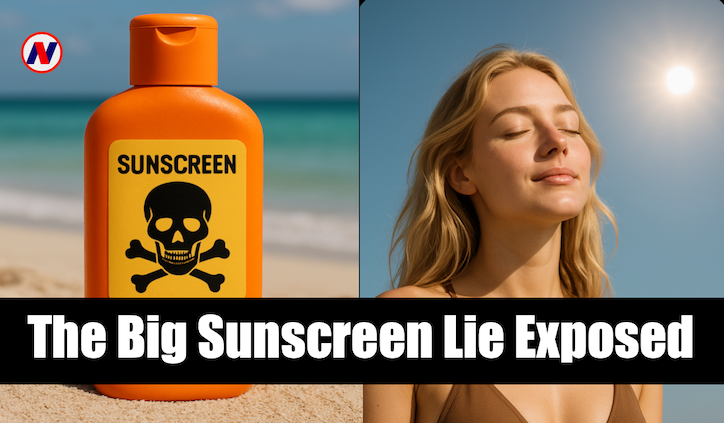Sunscreen is Dangerous to Your Health : How Scientists Demonised Nature to Sell You Poison
- Editor Darren Birks

- Aug 9
- 3 min read

They told you to fear the sun — to block it, avoid it, and hide from the very thing your body depends on. Sunlight fuels immunity, hormones, and longevity. The real danger was never exposure. It was deprivation.
Scientists have, for decades, claimed that the sun is the cause of skin cancer, and this claim is never challenged. Ever. Governments launched fear-driven campaigns, doctors promoted it, and the public believed it, whilst pharmaceutical companies came to our rescue with a chemical concoction that we were to smother all over our bodies, every time the sun appeared, and, in doing so, just happened to make billions in profits when we do.
Somewhere along the line, the sun — the very life force and a vital component for your health, became linked to illness.
But, behind that fear-mongering lie is a hidden truth: your body is designed for sunlight. Sunlight isn’t your enemy. It’s your friend. It’s essential for your body, your physical and mental health.
“We evolved under the sun,” says Dr. Ana Simmons, a functional medicine physician. “It regulates our hormones, fuels our immune system, and kickstarts the production of vitamin D — one of the most critical compounds in the human body.”
Vitamin D deficiency
Vitamin D, often dubbed the “sunshine vitamin,” influences everything from bone health to mood, immunity to metabolic function. And yet, the same sun that gives us this vital hormone has been demonised for decades. By blocking UVB rays, sunscreen prevents the natural production of vitamin D — leaving millions deficient, especially in northern climates. This silent epidemic has been linked to a surge in autoimmune conditions, mood disorders, and even more aggressive cancers.
But convincing the public that nature is dangerous, corporations opened the door to a lifelong dependency — on bottles filled with chemicals, many of which do far more harm than good. The global market for sunblock is projected to be $25 billion in less than five years. Behind the curtain of “safety” lies a masterclass in profit-driven fear.
The Ingredients They Don’t Want You to Read
What’s really inside that “dermatologist recommended” bottle:
Oxybenzone – A known endocrine disruptor banned in parts of Hawaii for damaging coral reefs — and potentially your hormones.
Octinoxate – Linked to thyroid disruption and reproductive toxicity.
Retinyl Palmitate – A form of vitamin A that may actually accelerate skin damage when exposed to sunlight.
Fragrance – A catch-all term that can include hundreds of undisclosed chemicals, including phthalates.
Preventing cancer, or causing it?
There is now mounting real-world evidence that the chemicals in Sunscreen are, in fact, incredibly dangerous, with some now suggesting that, rather that preventing cancer, they’re actually causing it.
A 2020 FDA study found that active ingredients in sunscreen were not only found in the blood, but were still lingering in it days after a single application. Whilst Retinyl Palmitate has now been linked to skin cancer leading to U.S. drugs companies attempting to conceal the evidence with a huge ‘disinformation’ campaign.
Yet these products remain on shelves, marketed with medical endorsements. The message is simple: fear the sun, trust the tube.
For too long, we’ve been sold a giant lie. That nature — the very force that sustains us — is dangerous and that we must take a concoction of chemicals to keep it at bay.
But the science is catching up. Doctors, researchers, and wellness advocates are sounding the alarm. It’s time to reclaim the sun — wisely, moderately, and with respect.
That doesn’t mean baking for hours or ignoring real risks like sunburn. But it does mean questioning the blanket fear we've been sold and recognising the profound health benefits of sensible, unfiltered sunlight.
The truth is: the sun never lied; Big Pharma did.
Sources:
FDA Study on sunscreen absorption (2020)
Journal of the American Medical Association: Oxybenzone blood absorption
Harvard Health: Vitamin D deficiency and health risks
Environmental Working Group (EWG): Sunscreen ingredient safety
Related:





Comments